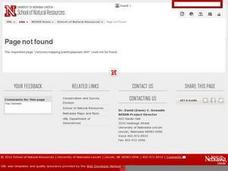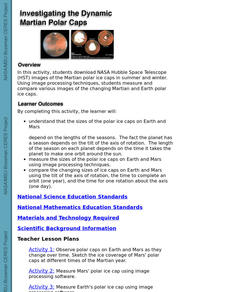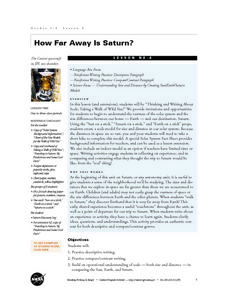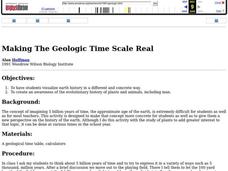Curated OER
Gravity
Sixth graders explore the characteristics of gravity. They discuss gravity on Earth and then use cereal boxes to research and compare the weight of objects on Earth to the weight of those objects on other planets.
Curated OER
Climate in the Western Regions
Learners examine the interactions of the Earth's systems and other objects in space. In this climate change lesson students study the pros and cons of different climates and what their preferences are.
Curated OER
Is it Really Winter in Australia? It is June!
The purpose of this activity is to determine how the location of a place on the Earth (hemisphere) determines what season that place is experiencing relative to the Sun's rays. Day one the students will be introduced to the terms...
Curated OER
Stellarium
Students explore the rotation of the planets from various locations on Earth
Using planetarium software, they will make observations, and explain how the rotation of the planets varies based on ones location on the Earth. Students...
Curated OER
Charting The Progress of New Horizons
Learners explore the long distances and timescales involved in space travel. They track the progress of the New Horizons spacecraft and access the New Horizons website to discover the distance of the spacecraft from the Sun, and then...
Curated OER
It's Hot
Third graders examine the effect of sunlight on the earth. Individually, they pick an article of clothing out of a bag and sort themselves based on the color of the shirt and whether it should be worn on a cold or a hot day. To end the...
Curated OER
The Sun
In this sun worksheet, students learn that the sun is a large star and recognize it's size in relation to the Earth. Students color the sun yellow.
Curated OER
Just How Big is this Place?
Students are introduced to the the formula for calculating travel time. They listen to different scenarios relating to long distance travel into space and calculate travel time using the formula.
Curated OER
Geometry of Radio Meteor Reflections
Ninth graders investigate and describe ways that human understanding of Earth and space has depended on technological development. They describe and interpret the science of optical and radio telescopes, space probes and remote sensing...
Curated OER
Painting the Hallway with Pixels
Students create science design to be painted on the wall in the hallway of the science area of the school building. They measure space available, make a scale model of the design, and paint different pixels.
Curated OER
Investigating the Dynamic Martian Polar Caps
Students download NASA Hubble Space Telescope images of the Martian polar ice caps in summer and winter, and measure and compare various images of the changing Martian and Earth polar ice caps.
Curated OER
Move Your Muscles!
Students, through teacher lecture and class discussion, explore the three different types of muscles in the human body and the effects of microgravity on these muscles. They explain what happens to muscles in outer space and describe the...
Curated OER
What Factors Impact a Greenhouse?
Young scholars analyze the Greenhouse Effect and the science of greenhouses. For this global climate lesson, students read background information about the 'greenhouse effect' and define 'albedo.' Young scholars examine pictures of...
Curated OER
Our Amazing Skeleton
Students study the skeleton, about the number of and types of bones in the body, and how outer space affects astronauts' bones. They discover how to take care of their bones here on Earth to prevent osteoporosis, or, weakening of the...
Curated OER
Making Clouds: Aerosol-Cloud Interactions in a Beaker
Students observe a teacher demo on how clouds form. In this earth science lesson, students discover how cloudiness affects relative humidity. They explain the scattering of light by clouds.
Curated OER
Find It!
Students analyze the basic concept of Global Positioning Systems using triangulation and measurement on a small scale in the classroom. They describe a satellite and how it helps in locating a person on Earth. They explain how...
Curated OER
How Far Away Is Saturn?
Students work together to create a scale model of the solar system. They write a descriptive paper and a paper comparing and contrasting the Earth to Saturn. They discuss their writings with the class.
Curated OER
Organisms and Their Environment
Students explore Earth's biosphere. In this biosphere lesson, students participate in group activities regarding biotic and abiotic factors, population density, and species' habitats.
Curated OER
Making The Geologic Time Scale Real
Students are assigned significant geologic events in Earth's history. They convert the date of the events into distances and then space themselves (on an outside playing field) away from other groups, to represent time between various...
Curated OER
Detecting Meteors by Radio in the Classroom
Twelfth graders describe and interpret the science of optical and radio telescopes, space probes and remote sensing technologies (Unit E) They explain the role of radio and optical telescopes in determining characteristics of stars and...
Curated OER
An Invisible Pull
Fifth graders explain why objects thrown upward falls back to Earth. In this earth science lesson plan, 5th graders identify the forces acting on objects. They discuss why planets do not float in space.
Curated OER
Cooling With Sunshades
Learners conduct research in order to find the effects of properties exposed to heat and how they change temperature. They consider the effect of sunlight upon objects that are placed outside with the help of an experiment. They also...
Curated OER
Charting Seasonal Changes
Learners research the Earth's patterns of rotation and revolution, create a chart and graph of these patterns and use them to explain the causes of night and day and summer and winter.
Curated OER
Plate Tectonics - Electronic Scavenger Hunt
Students explore the attributes of plate tectonics. In this plate tectonics lesson, students use computers to access a plate tectonics scavenger hunt file and complete the required activities using their textbooks.























